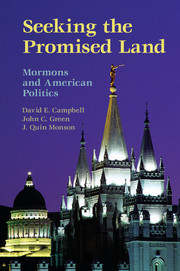Book contents
- Frontmatter
- Dedication
- Contents
- Preface
- Acknowledgments
- Part I Mormons as an Ethno-Religious Group
- Part II Political Behavior of Mormons
- Part III The Consequences of Distinctiveness
- 7 Assessing the Saints
- 8 A Stained-Glass Ceiling?
- 9 How Mormonism Affected Mitt; How Mitt Affected Mormonism
- 10 Seeking the Promised Land
- Data Appendix
- Bibliography
- Index
9 - How Mormonism Affected Mitt; How Mitt Affected Mormonism
Published online by Cambridge University Press: 05 August 2014
- Frontmatter
- Dedication
- Contents
- Preface
- Acknowledgments
- Part I Mormons as an Ethno-Religious Group
- Part II Political Behavior of Mormons
- Part III The Consequences of Distinctiveness
- 7 Assessing the Saints
- 8 A Stained-Glass Ceiling?
- 9 How Mormonism Affected Mitt; How Mitt Affected Mormonism
- 10 Seeking the Promised Land
- Data Appendix
- Bibliography
- Index
Summary
Chapter 8 provided an overview of Mitt Romney’s political career and the role Mormonism has played within it. In this chapter, we dig deeper into voters’ reactions to Romney’s LDS faith. To do so, we begin with two incidents from his first and last campaigns that illustrate the Mormon paradox: peculiar people or quintessential Americans?
Romney’s religion was first used against him during his unsuccessful 1994 U.S. Senate campaign against Ted Kennedy. With Romney and Kennedy tied in the polls and the campaign heating up, Joseph Kennedy, Ted’s nephew and a member of the House of Representatives, played the religion card. He told reporters:
I believe very strongly in the separation between church and state. But I think that if a particular church has a belief that blacks are second-class citizens, and that’s the stated belief of the church, or that women are second-class citizens, I mean you ought to take a look at those issues.
(quoted in Allot 2012)Kennedy later apologized, saying that he was unaware that the LDS Church had ended its racial restrictions in 1978 but, in doing so, nonetheless again reminded voters of the Church’s controversial history regarding race. Notwithstanding his nephew’s apology, Ted Kennedy himself entered the fray by once again raising the issue of the LDS Church and its pre-1978 racial policies. The Kennedy campaign was only picking up where Romney’s opponent in the Republican primary, John Lakian, had left off. He too had broached the issue of Romney’s religion, even referring to Romney as “Mr. Mormon” during a televised debate (R. L. Welch and Jensen 2007).
- Type
- Chapter
- Information
- Seeking the Promised LandMormons and American Politics, pp. 222 - 252Publisher: Cambridge University PressPrint publication year: 2014

